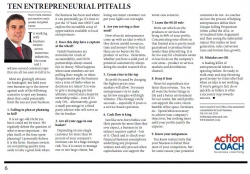
Trevor Clark, Business and executive coach; speaker and global trainer - Ten Entrepreneurial Pitfalls RSS Trevor Clark, Business and executive coach; speaker and global trainer - Ten Entrepreneurial Pitfalls2016-10-18 In working with business owners across numerous industries, the team and I witness several common traps that are all too easy to fall in to. Most are glaringly obvious (in hindsight), but hold your own business up to the mirror against each of the following scenarios to spot any banana skins that could potentially limit the success your business.
1. Failing to plan or planning to fail? It is an age-old cliché yes, but it could not be truer. We regularly debate the question of what is more important â€" the plan itself, or the time spent planning? I personally believe it is the latter. Business owners are not putting quality time aside to take a good look where the business has been and where it can potentially go. It’s time to put the ‘O’ back into SWOT and explore the incredible array of opportunities available to local entrepreneurs. 2. Does this ship have a captain at the wheel? Family businesses are notorious for a lack of accountability, and 50:50 partnerships always sound fair in theory. What happens when team members are not pulling their weight, or when disagreements put the business into a state of limbo when no decisions are taken? It is wise to give a managing partner ultimate control and a majority ownership stake â€" even if it’s only 51%. Alternatively, grant a small percentage to a third party advisor who will serve as the tie-breaker. 3. Are all your eggs in one basket? Depending on one single customer for more than 50 percent of your company’s revenues can be a huge strategic risk. Yes, it is easier to manage one or two large clients, but losing one major customer can put your lights out overnight. 4. Are you serving a clear need? How often do entrepreneurs come up with an idea to which they devote untold resources, time and money? Only to find there are no buyers for the product or service. Determine whether you have a solid pool of potential customers by always doing the market research first. 5. Cream rises to the top Be profit-focused by charging the highest prices your markets will allow. Too many entrepreneurs try to make up for low margins with high volumes. This strategy rarely succeeds â€" especially if yours is a service-based operation. 6. Cash flow is king Just like new-born babies cost their parents far more than they ever expect, a business in its infancy requires capital â€" lots of it. Check and re-check your financial business assumptions underlying any proposed venture and only proceed when capitalisation can support the worst-case scenario. 7. Learn the 80:20 rule Work out which are the products or services that bring in 80% of your profits. Concentrating your efforts in that limited area is pretty much guaranteed to produce better results than diversifying. It is far too easy for a business owner to lose focus on the company’s core areas - product or service, markets and distribution channel. 8. Keep it lean Never let expenditure rise faster than revenue. Yes, we all want the better things in life and a better environment for our teams, but until profits can support the costs, retain humble office space, furniture, etc. Spend when necessary to achieve your company’s objectives, but nothing more until your profits justify the expense. 9. Know your uniqueness You know instinctively that your business is better than most of your competitors, but for some reason your potential customers do not. As coaches we love the process of helping entrepreneurs define their Unique Selling Proposition (often called the ASA, or Articulated Sales Argument) and then seeing the substantial impact this makes on lead generation, sales conversion rates and bottom-line growth. 10. Mistakes are OK A leading killer of entrepreneurial talent is ignoring failure. Be ready to walk away and stop throwing good money (or time) after bad when an idea is not working. If you’re going to fail, do so quickly, as failure is often a necessary step towards success. Get in touch if you’d like a free assessment consultation for your business. Tel: 031 266 2258 durban@actioncoach.com www.mastery.co.za |
Trevor Clark, Business and executive coach; speaker and global trainer - Ten Entrepreneurial Pitfalls
Copyright © 2024 KwaZulu-Natal Top Business